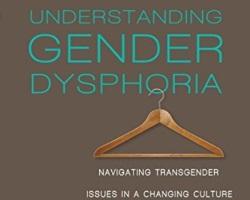Intervarsity Press 2015, 189 pp., $20
Could the timing be better for a book to be released on the topic of gender dysphoria? Were you aware of this term a year ago and what it means? Whatever you knew or didn’t know then, now you have an excellent resource in Mark Yarhouse’s most recent work, Understanding Gender Dysphoria. He has written extensively on sexuality and gender, and in this book he offers a scholarly look at the issue of gender dysphoria and gives us this definition:
“The experience of having a psychological and emotional identity as either male or female, and that your psychological and emotional identity does not correspond to your biological sex” (p. 19).
From the first to the final page, Mark Yarhouse writes to inform, educate and challenge his readers to be aware and sensitive to this demographic. The author ends his book with these concluding thoughts on how he hopes to see the church’s thoughtful response for ministry:
• Critical analysis and engagement with the work being done in the area of sex and gender
• Thoughtful engagement with best practices in clinical service provision to those who have be diagnosed with Gender Dysphoria
• Listening to the experiences of faithful believers who are navigating gender identity conflicts in their own lives
• Identifying the best way to be a faithful witness to a broader culture in which norms regarding sex and gender are eroding
• Engaging with “convicted civility” those who are actively deconstructing norms related to both sex and gender
• Identifying and implementing best practices as the body of Christ and, in particular, the local church in relation to unchurched and dechurched transgender persons
• Providing sensitive pastoral care to those in the Body of Christ who are navigating this terrain (p. 160).
I cannot think of a more important time than the present to be gathering information on this topic, to help shape your position, refine it or perhaps change it. You can count on it as fact that this issue will show up within your ministry boundaries in one form or another, and it is in your best interest to be ready to determine how you will respond. Mark Yarhouse is asking the church to change, grow and become uncomfortable:
“The church is going to need to spend some time on this topic. I urge church leaders to spend time in careful reflection as we think about the best way to engage the broader culture from more of a missional approach while simultaneously considering how to come alongside people within our own Christian communities who are navigating this terrain” (p. 22).
Yarhouse has presented a thoughtful, scholarly work on this current cultural issue. I cannot stress strongly enough that this book should be read and available to every ministering person who has opportunity to work with people—the church!




